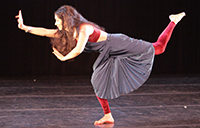York University Professors Tania Ahmad and Zulfikar Hirji, both of anthropology, and film Professor Ali Kazmi will lead a discussion on “Women in Dance in Muslim Societies” at the new Aga Khan Museum in Toronto.

The panel discussion is part of the museum’s inaugural season and its contemporary exhibition, performances and lectures focusing on Pakistan. It will take place Tuesday, Oct. 21, at 8pm at the Aga Khan Museum, 77 Wynford Dr., Toronto.
The talk is preceded by a short dance performance by the inaugural Aga Khan Museum artist-in-residence Tehreema Mitha, a United States-based, Pakistan-born dancer. It will be followed by a screening of the film The Vigil, directed by Arya Surowidjojo, segments of which were filmed at York University when Mitha performed at here in May 2009.
The film details Mitha’s efforts to revitalize a 4,000-year-old dance tradition in Pakistan and her struggles to mount a dance tour of Islamabad, Karachi, and her hometown of Lahore in the face of many social challenges. It also follows her struggles in trying to reach audiences in North America.
“Mitha’s life and work always sits at the uncertain cusp of being and becoming and Surowidjojo’s film frames her experience of negotiating a space for her artistic expression in Pakistan and America and somehow belonging to neither,” says Hirji.

Hirji has followed Mitha’s career for more than a decade and produced his own 25-minute ethnographic film on her work, Pushpanjali, in 2011. “Surowidjojo’s film takes a more conventional documentary approach than I did, but it’s his subject matter – Tehreema and her unique take on classical South Asian dance, bhratanatyam – that forces you to keep your eyes on the screen,” he says.
Following the performances, Mitha will join the professors in discussing the issues faced by women in dance.
“I am very curious how the audience will receive Mitha’s work on screen, live on stage and then as part of the panel discussion, especially in the current world context when various forms of Muslim culture and expression, which have long and rich histories, are disappearing from view,” adds Hirji.
For more information, and to purchase tickets, visit the Aga Khan Museum website.


